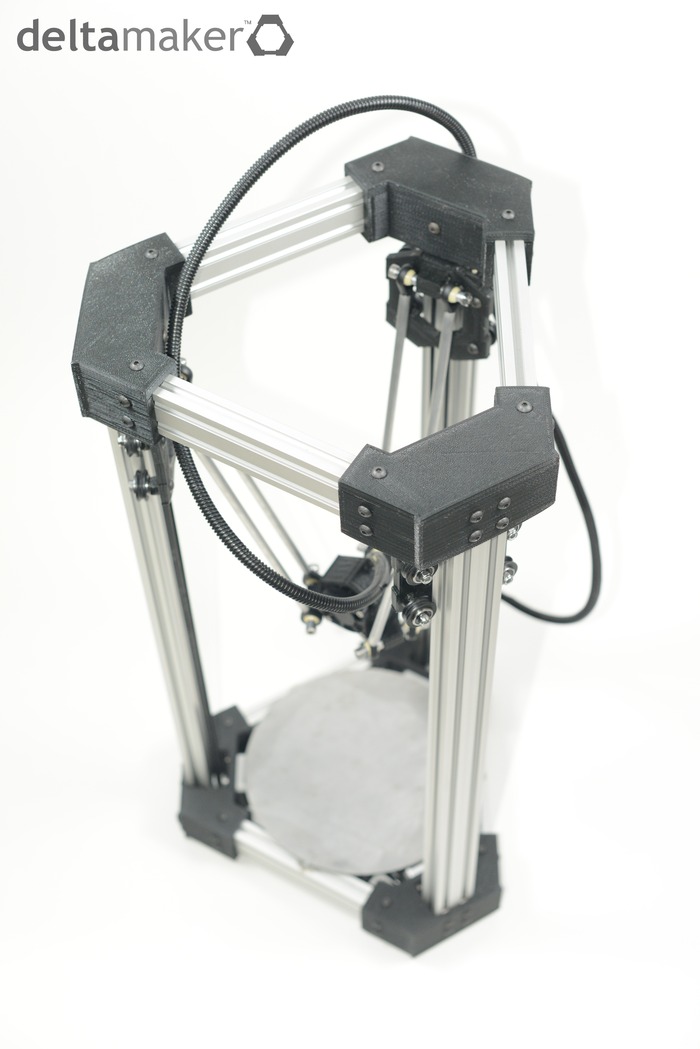DeltaMaker: the Newest Kickstarter 3D Printer Success

The DeltaMaker 3D printer, seen top-down. Courtesy of DeltaMaker.
Latest News
February 28, 2013
Success or failure for any business venture is as much about luck and marketing as the product or service offered. Project funding on Kickstarter proves this point as well as any marketing class could ever hope. I’ve talked about marketing success on Kickstarter before when looking at the RoBo 3D, and you could almost think of this post as a companion piece.
The DeltaMaker is the newest 3D printer project on Kickstarter to be fully funded. It’s managed to raise almost $148,000, putting it around $40,000 over its goal. The hobbyist additive manufacturing (AM) system from the company of the same name has taken a unique angle, literally, on 3D printing by basically setting a printer on end to allow for a larger build area with a smaller footprint.
The Kickstarter page for DeltaMaker talks about printing high resolution objects faster than other AM systems, but doesn’t offer any specifics to back up the claim.
The DeltaMaker is described as “elegant” and “fun to watch,” which are subjective ideas and pure marketing speak. Personally, I tend to think that once you’ve seen any material deposition machine lay down a few layers of plastic, you’ve basically seen ‘em all. While not quite as uninteresting as watching paint dry, I can’t imagine anyone is really excited to watch build after build come off a 3D printer.
So, how about specifics? The DeltaMaker lays claim to a build envelope of 10 in. diameter x 11 in. tall (254 mm x 279 mm), but that is labeled as approximate. It offers a resolution of up to 100µ, uses 1.75 mm PLA or ABS filament, and a heated build platform is optional. The Kickstarter price is $1,599, with a retail price being estimated at $1,999.
Not to rain on DeltaMaker’s parade, but that seems kind of expensive for what’s being offered. You can buy a MakerBot Replicator 2 for $2,199, or the previously mentioned RoBo 3D for $599, both of which offer the same resolution, and nearly the same build envelope. So what does the DeltaMaker have going for it? Testimonials.
The top of its Kickstarter page is filled with quotes from various tech sites or blogs. It’s the gee-whiz factor that probably helped put this new AM system over the top. Everybody knows at least one tech junkie. The people that always buy the latest gadget probably get most of their news from tech sites, so it’s no wonder a prominent display of endorsements would rally interest.
I took a quick look at 3D printer Kickstarter projects. I found 31 printers on the site, with 16 of them receiving full funding. Some of them just squeaked past the project goal, while others, like the FORM 1 with almost $3 million in funding, smashed right past it. That beats Kickstarter’s general success rate of 43.51%, and most 3D printer’s goals are far higher than the average successful goal of $10,000.
The main difference in success or failure, if you ignore the potential offered by FORM 1, is presentation. Projects with better marketing skills, or that presented their product as somehow being unique, seem to have fared better overall. That’s hardly surprising, as any Apple devotee can provide you with an example of how marketing affects consumer judgment.
The new, shininess of 3D printers probably explains the statistical difference in success rate versus other projects, and it’ll be interesting to see if startup companies can maintain that rate over a longer period of time. In the meantime, however, expect to see more AM systems pop up on Kickstarter, and I’ll be here to keep an eye on them.
Below you’ll find the Kickstarter video for the DeltaMaker.
Source: Kickstarter
Subscribe to our FREE magazine, FREE email newsletters or both!
Latest News
About the Author
John NewmanJohn Newman is a Digital Engineering contributor who focuses on 3D printing. Contact him via [email protected] and read his posts on Rapid Ready Technology.
Follow DE






